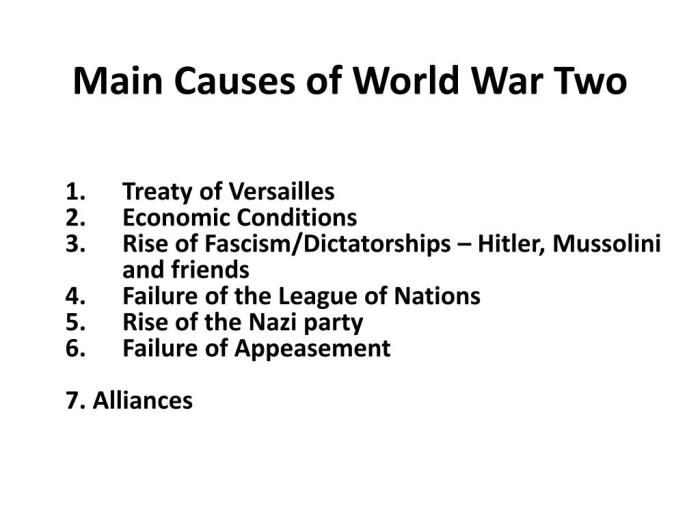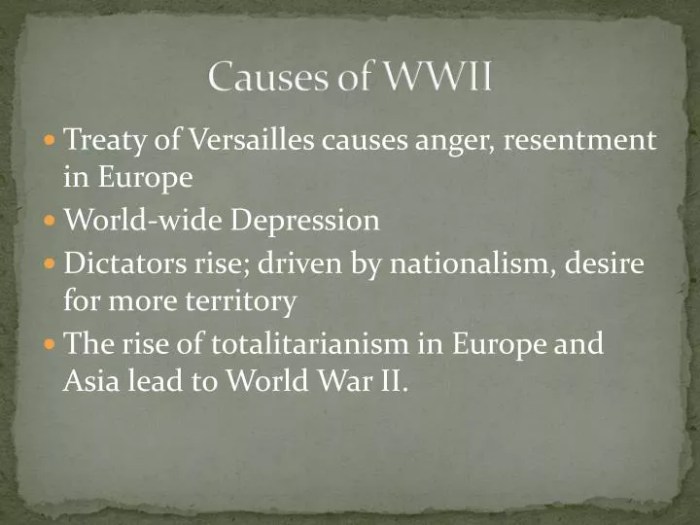World War 2 Causes of WW2 Key Terms Worksheet Answers: A Comprehensive Guide delves into the historical background, causes, key terms, and worksheet answers related to the devastating conflict. This guide provides a thorough understanding of the complex factors that led to the outbreak of World War 2 and the key concepts that shaped its course.
The guide begins by examining the political and economic conditions in Europe that set the stage for the war. It then analyzes the role of nationalism, militarism, and the Treaty of Versailles in fueling tensions. The discussion also explores the failure of appeasement as a diplomatic strategy.
Historical Background of World War 2: World War 2 Causes Of Ww2 Key Terms Worksheet Answers
World War II was a global conflict that lasted from 1939 to 1945, involving the vast majority of the world’s countries—including all of the great powers—forming two opposing military alliances: the Allies and the Axis. In a state of total war, directly involving more than 100 million personnel from more than 30 countries, the major participants threw their entire economic, industrial, and scientific capabilities behind the war effort, blurring the distinction between civilian and military resources.
World War II was the deadliest conflict in human history, marked by 50 to 85 million fatalities, most of whom were civilians in the Soviet Union and China. Tens of millions of people died due to genocides (including the Holocaust), premeditated death from starvation, massacres, and disease.
Aircraft played a major role in the conflict, including in the strategic bombing of population centers, the development of nuclear weapons, and the only two uses of such in war.
The following are key events that contributed to the outbreak of World War II:
- The Treaty of Versailles (1919) imposed harsh reparations on Germany, which contributed to economic instability and resentment in the country.
- The rise of fascism in Italy and Germany in the 1920s and 1930s, which promoted aggressive nationalism and militarism.
- The failure of the League of Nations to prevent aggression by the Axis powers, such as Japan’s invasion of Manchuria in 1931 and Italy’s invasion of Ethiopia in 1935.
- The Munich Agreement (1938), in which Britain and France allowed Germany to annex the Sudetenland, a part of Czechoslovakia, in an attempt to appease Hitler and avoid war.
- The German invasion of Poland on September 1, 1939, which marked the beginning of World War II.
Causes of World War 2
Nationalism and Militarism
Nationalism and militarism were two key factors that contributed to the outbreak of World War II. Nationalism is a strong sense of pride in one’s country and a belief in its superiority over others. Militarism is a belief in the importance of military strength and a willingness to use it to achieve national goals.
In the years leading up to World War II, nationalism and militarism were on the rise in many countries, particularly in Germany, Italy, and Japan.
The Treaty of Versailles
The Treaty of Versailles, which was signed at the end of World War I, imposed harsh reparations on Germany and stripped it of territory. This treaty was deeply resented by many Germans, who felt that it was unfair and unjust.
The resentment caused by the Treaty of Versailles contributed to the rise of Nazism in Germany and the outbreak of World War II.
The Failure of Appeasement
Appeasement is a diplomatic strategy that involves making concessions to an aggressor in order to avoid war. In the years leading up to World War II, the British and French governments pursued a policy of appeasement towards Germany. They hoped that by giving Hitler what he wanted, they could avoid war.
However, appeasement only emboldened Hitler and made him more aggressive. In the end, appeasement failed to prevent World War II.
Key Terms and Concepts

Appeasement
Appeasement is a diplomatic strategy that involves making concessions to an aggressor in order to avoid war.
Axis Powers
The Axis Powers were the countries that fought against the Allies in World War II. The Axis Powers included Germany, Italy, and Japan.
Blitzkrieg
Blitzkrieg is a German military strategy that involves using fast-moving, armored forces to quickly overrun an enemy’s defenses.
Holocaust
The Holocaust was the systematic genocide of approximately six million Jews by the Nazis during World War II.
Worksheet Answers

What were the three main causes of World War 2?
The three main causes of World War II were nationalism and militarism, the Treaty of Versailles, and the failure of appeasement.
Who were the leaders of the major powers involved in the war?, World war 2 causes of ww2 key terms worksheet answers
- Germany: Adolf Hitler
- Italy: Benito Mussolini
- Japan: Hideki Tojo
- Great Britain: Winston Churchill
- United States: Franklin D. Roosevelt
- Soviet Union: Joseph Stalin
What were the key battles and turning points of the war?
- Battle of Britain (1940): A major air battle in which the British Royal Air Force defeated the German Luftwaffe.
- Operation Barbarossa (1941): The German invasion of the Soviet Union, which was a major turning point in the war.
- Battle of Stalingrad (1942-1943): A major battle in which the Soviet Red Army defeated the German Wehrmacht.
- D-Day (1944): The Allied invasion of Normandy, which was a major turning point in the war.
- Battle of the Bulge (1944-1945): A major battle in which the Allies defeated the last major German offensive.
Question Bank
What were the three main causes of World War 2?
The three main causes of World War 2 were the rise of nationalism and militarism, the impact of the Treaty of Versailles, and the failure of appeasement.
Who were the leaders of the major powers involved in the war?
The leaders of the major powers involved in World War 2 were Winston Churchill (United Kingdom), Franklin D. Roosevelt (United States), Joseph Stalin (Soviet Union), Adolf Hitler (Germany), and Benito Mussolini (Italy).
What were the key battles and turning points of the war?
The key battles and turning points of World War 2 included the Battle of Britain, the Battle of Stalingrad, the Battle of Midway, and the D-Day landings.